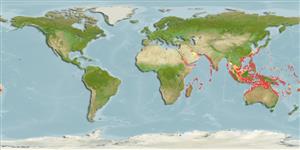Environment: milieu / climate zone / depth range / distribution range
Ecology
Marine; reef-associated; depth range 10 - 70 m (Ref. 90102), usually 40 - ? m (Ref. 9710). Tropical
Indo-West Pacific: east coast of Africa east to New Caledonia; north to southern Japan.
Size / Weight / Age
Maturity: Lm ? range ? - ? cm
Max length : 20.0 cm SL male/unsexed; (Ref. 48635); common length : 31.0 cm TL male/unsexed; (Ref. 5450)
Dorsal spines (total): 13; Dorsal soft rays (total): 10; Anal spines: 3; Anal soft rays: 6 - 7. Reddish brown with alternating broad and thin dark bars separated by white; dark spot on cheek; small tentacle above eye which may be banded; upper half of pectorals with large dark spots on inner surface (Ref. 4313).
Found on the continental shelf (Ref. 75154). A rare inhabitant of rocky bottoms of deep offshore reefs. Normally found on soft-bottom or muddy substrates with rich rubble ridges amongst rich invertebrate growth, especially sponges (Ref. 48635). Sold fresh in small quantities in markets. Also found among soft corals, solitary or in small groups (Ref 90102).
Life cycle and mating behavior
Maturity | Reproduction | Spawning | Eggs | Fecundity | Larvae
Eschmeyer, W.N., 1986. Scorpaenidae. p. 463-478. In M.M. Smith and P.C. Heemstra (eds.) Smiths' sea fishes. Springer-Verlag, Berlin. (Ref. 4313)
IUCN Red List Status (Ref. 130435: Version 2024-1)
Threat to humans
Harmless
Human uses
Fisheries: minor commercial
Tools
Special reports
Download XML
Internet sources
Estimates based on models
Preferred temperature (Ref.
123201): 24 - 28.6, mean 27.2 °C (based on 35 cells).
Phylogenetic diversity index (Ref.
82804): PD
50 = 0.5005 [Uniqueness, from 0.5 = low to 2.0 = high].
Bayesian length-weight: a=0.01000 (0.00524 - 0.01907), b=3.02 (2.85 - 3.19), in cm total length, based on LWR estimates for this species & (Sub)family-body (Ref.
93245).
Trophic level (Ref.
69278): 3.9 ±0.6 se; based on size and trophs of closest relatives
Resilience (Ref.
120179): Medium, minimum population doubling time 1.4 - 4.4 years (Preliminary K or Fecundity.).
Fishing Vulnerability (Ref.
59153): Low vulnerability (14 of 100).
